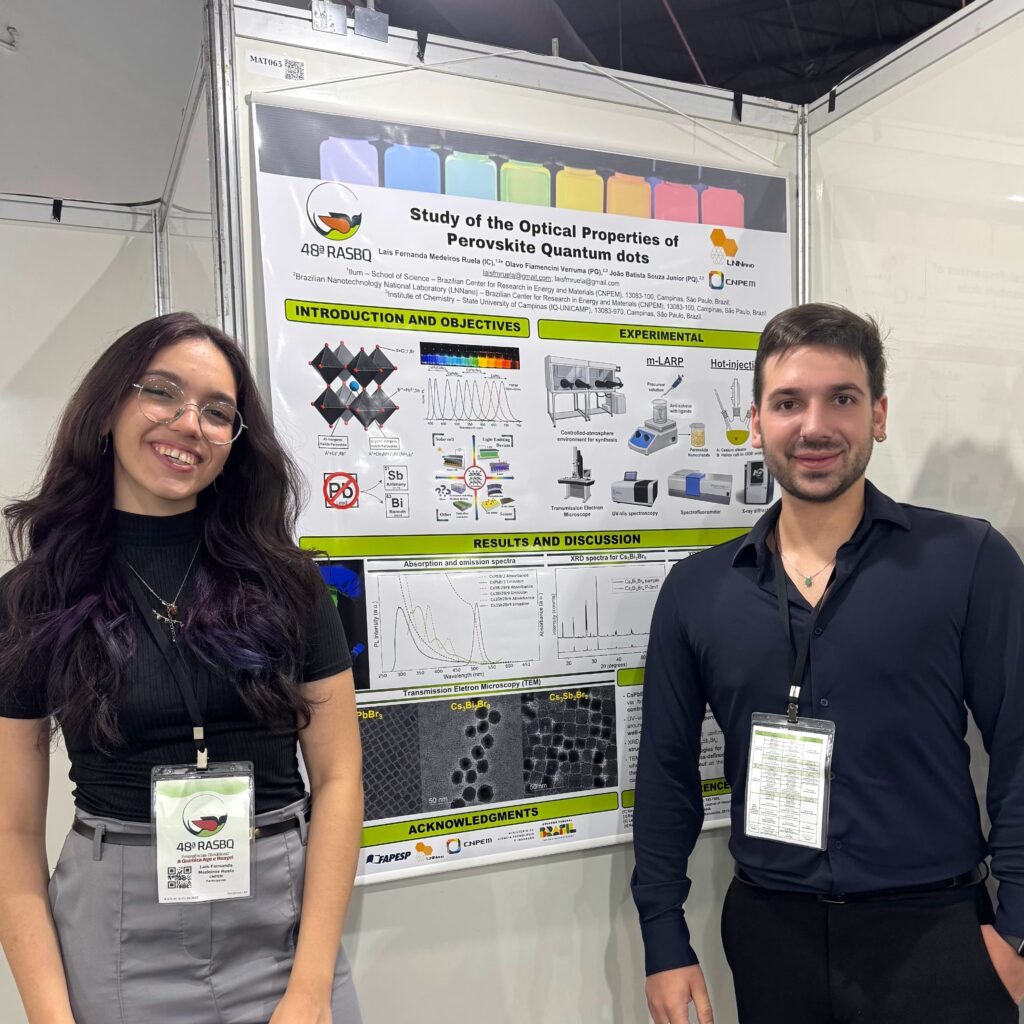Of the 1,600 scientific papers evaluated during the event, research on perovskite ranked among the top five submissions
Laís Fernanda Medeiros Ruela, a student in her final year at the Ilum School of Science, was among the five best posters in the Chemistry of Materials category at the 48th Annual Meeting of the Brazilian Chemical Society. The award-winning project is the result of research that started in October of last year, during Laís’s introductory research work in the Nanotechnology Laboratory at CNPEM, the Brazilian Center for Research in Energy and Materials. The study was a partnership with coauthor Olavo Fiamencini Verruma and carried out under the guidance of Professor João Batista Souza Junior.
“It was very important to have this project recognized. I’m only 20 years old, I started my introduction to research fellowship only a few months ago and I was at a congress with 1,600 people presenting their posters. Out of all these people, they thought our work deserved an award,” said Laís, whose introductory research fellowship was renewed so she can continue her research in the area. She also thanked Ilum’s advisors and collaborators for their unconditional support as she carried out the project.
The award-winning research focused on perovskite, a mineral that has been gaining attention over the past decade for the manufacture of devices such as solar cells and electronics. “Researchers have conducted many studies on this material, since it contains lead. We are replacing lead with other less toxic elements like antimony and bismuth,” she explained.

The Annual Meeting of the Brazilian Chemical Society is the largest scientific meeting in the field in Latin America. Its objective is to pursue advances in science, innovation, education, formulation of public policies, training of human resources and scientific dissemination. The theme of this year’s event, which brought together more than 2,500 participants from 19 countries, was “Climate Emergencies? Chemistry Acts and Reacts.”
During the second semester, Laís will combine the final project for her undergraduate degree at Ilum with her research efforts, and is considering the possibility of pursuing an academic career with the same group. “I may continue with this research after graduation,” she concluded.
During the second semester, Laís will combine the final project for her undergraduate degree at Ilum with her research efforts, and is considering the possibility of pursuing an academic career with the same group. “I may continue with this research after graduation,” she concluded.
About the Ilum School of Science
Ilum offers a free undergraduate degree program that utilizes an interdisciplinary approach to train scientists and professionals in science and technology. With an innovative educational model, the three-year full-time bachelor program offers courses that connect life sciences, materials science, data science, artificial intelligence, and the humanities in order to prepare researchers to work in an ethical and collaborative manner in the search for solutions to the global challenges of the twenty-first century. The Ilum School of Science is funded by the Brazilian Ministry of Education (MEC) and is part of the Brazilian Center for Research in Energy and Materials (CNPEM) in Campinas, São Paulo, a social organization overseen by the Ministry of Science, Technology, and Innovation (MCTI). Ilum’s educational mission offers early contact with experimental activities, in teaching labs at the school as well as at CNPEM, in projects carried out together with researchers.
About CNPEM
The Brazilian Center for Research in Energy and Materials (CNPEM) is home to a state-of-the-art, multi-user and multidisciplinary scientific environment and works on different fronts within the Brazilian National System for Science, Technology and Innovation. A social organization overseen by the Ministry of Science, Technology and Innovation (MCTI), CNPEM is driven by research that impacts the areas of health, energy, renewable materials, and sustainability. It is responsible for Sirius, the largest assembly of scientific equipment constructed in the country, and is currently constructing Project Orion, a laboratory complex for advanced pathogen research. Highly specialized science and engineering teams, sophisticated infrastructure open to the scientific community, strategic lines of investigation, innovative projects involving the productive sector, and training for researchers and students are the pillars of this institution that is unique in Brazil and able to serve as a bridge between knowledge and innovation. CNPEM’s research and development activities are carried out through its four National Laboratories: Synchrotron Light (LNLS), Biosciences (LNBio), Nanotechnology (LNNano), Biorenewables (LNBR), as well as its Technology Unit (DAT) and the Ilum School of Science — an undergraduate program in Science and Technology supported by the Ministry of Education (MEC).
https://cnpem.br/en/






